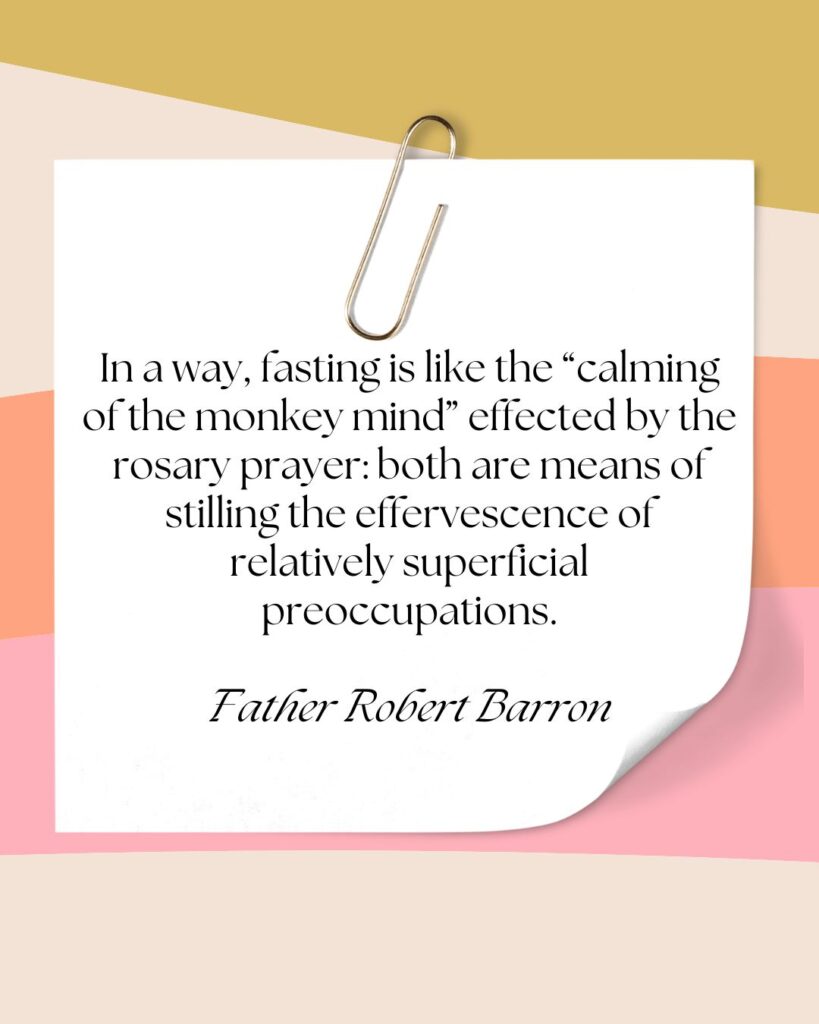Fasting, or intermittent fasting, is a great tool used in Western medicine and functional health practices to balance blood sugar, improve insulin receptivity, and improve digestion. While most people can benefit from fasting, it isn’t recommended for everyone. Body type and health conditions, as well as seasons of life like pregnancy or nursing, can decrease the effectiveness of fasting. Understanding when to use fasting is key to unlocking its benefits.
There is also a spiritual component to fasting that I don’t want to ignore. Fasting is a great way to practice detachment from things that could come between you and God. It also improves self-discipline, which we often sorely lack. Father Mike Schmitz asked, “Why do we fast from good things during Advent and Lent?” He answered, “Because I need to realize that if I don’t have these things in my life, I’ll still be fine.” Combining fasting with prayer increases our receptivity to God and helps us cling to him through the difficult seasons of life.

The physical benefits of fasting have been studied for a long time. A recent study from Cambridge suggests that fasting reduces inflammation by increasing levels of a chemical called arachidonic acid in the blood, which inhibits inflammation. Since we know that Western diseases such as heart disease, inflammatory bowel diseases, ulcerative colitis, and Crohn’s are linked to inflammation, we cannot ignore this.
In 2024, researchers conducted a meta-analysis on the effects of intermittent fasting on body composition and cardiometabolic health in adults with prediabetes or type 2 diabetes. Fourteen studies were reviewed, revealing that intermittent fasting reduced body weight, hemoglobin A1c, fasting glucose, total cholesterol, and triglycerides. The research concluded that intermittent fasting produced better outcomes than caloric restriction alone.
Some studies point to improvements in gut microbiota during intermittent fasting. Some bacteria don’t need food to survive and will happily live off the slimy buildup in the gut. These same bacteria make a short-chain fatty acid called butyrate, which is vital for gut health. Butyrate reduces inflammation and abdominal pain, increases insulin sensitivity, protects the brain, and protects against cardiovascular disease.
With all of these benefits, shouldn’t everyone be fasting? The answer may surprise you. No, fasting isn’t suitable for everyone. People who are “thin and lanky” should not engage in prolonged fasting, as it can increase the risk of low blood sugar, which may lead to symptoms such as nausea, lightheadedness, dizziness, and fainting. Women who are pregnant or nursing should also refrain from intermittent fasting. Young adults and the elderly should likewise avoid this practice.
Those with excess body types, such as Arnold Schwarzenegger or Tony Soprano, can significantly benefit from intermittent fasting. These types tend to have digestion that doesn’t fully kick in until later in the day. A longer fasting window of 18 hours places their eating window squarely when the body is most prepared to burn calories.
Interestingly, as I’ve worked with my clients, I have found that people often do the opposite of what their body type suggests. My thin and lanky clients generally want to be vegetarians, skip meals at random, and fast for days, while my clients with excess body weight tend to eat large amounts of fat and protein and avoid fasting altogether! I spend a lot of time helping people understand their body types so they can eat better for their health.
We’ve discussed intermittent fasting extensively, but let’s talk about other ways to fast for your health. Fasting doesn’t have to be all about timing. Consider fasting junk food, dairy, red meat (to reduce cholesterol), alcohol, or sugar for a time. This is fasting that all body types can benefit from.

Instead of focusing solely on food-centered fasting, consider fasting from social media, especially before bed. If you live in a bike-friendly town, fast from driving your car and ride your bike or take public transportation. How about fasting from negativity and writing daily in a gratitude journal? These practices are great for improving your health and increasing your self-discipline.
As we approach the Lenten season, consider prayerfully how to fast. Don’t just give up chocolate again! Make it challenging in some way. If you’ve been successful at fasting meat on Fridays, add a Wednesday fast as well. Remember, fasting has many health and spiritual benefits. You’ve got this!
If you still have questions or need some accountability, reach out. I’m here to help!
The following sources were used in this post:
Pereira, M., et al. (2024). Arachidonic acid inhibition of the NLRP3 inflammasome is a mechanism to explain the anti-inflammatory effects of fasting. Cell Reports. doi.org/10.1016/j.celrep.2024.113700.
Khalafi M, Habibi Maleki A, Symonds ME, Rosenkranz SK, Rohani H, Ehsanifar M. The effects of intermittent fasting on body composition and cardiometabolic health in adults with prediabetes or type 2 diabetes: A systematic review and meta-analysis. Diabetes Obes Metab. 2024 Sep;26(9):3830-3841. doi: 10.1111/dom.15730. Epub 2024 Jul 2. PMID: 38956175.
Chen J, Vitetta L. The Role of Butyrate in Attenuating Pathobiont-Induced Hyperinflammation. Immune Netw. 2020 Feb 4;20(2):e15. doi: 10.4110/in.2020.20.e15. PMID: 32395367; PMCID: PMC7192831.
Banasiewicz T, Krokowicz Ł, Stojcev Z, Kaczmarek BF, Kaczmarek E, Maik J, Marciniak R, Krokowicz P, Walkowiak J, Drews M. Microencapsulated sodium butyrate reduces the frequency of abdominal pain in patients with irritable bowel syndrome. Colorectal Dis. 2013 Feb;15(2):204-9. doi: 10.1111/j.1463-1318.2012.03152.x. PMID: 22738315.
Sanna, S., Van Zuydam, N. R., Mahajan, A., Kurilshikov, A., Vich Vila, A., Võsa, U., Mujagic, Z., Masclee, A. A., Jonkers, D. M., Oosting, M., Joosten, L. A., Netea, M. G., Franke, L., Zhernakova, A., Fu, J., Wijmenga, C., & McCarthy, M. I. (2019). Causal relationships among the gut microbiome, short-chain fatty acids and metabolic diseases. Nature Genetics, 51(4), 600-605. https://doi.org/10.1038/s41588-019-0350-x
Cantu-Jungles, T. M., Rasmussen, H. E., & Hamaker, B. R. (2019). Potential of Prebiotic Butyrogenic Fibers in Parkinson’s Disease. Frontiers in Neurology, 10, 663. https://doi.org/10.3389/fneur.2019.00663
 Daja’s Story: Healing From Crohn’s
Daja’s Story: Healing From Crohn’s DILUTION IS THE SOLUTION
DILUTION IS THE SOLUTION One Small Step
One Small Step You Are Unique and You’re Story Matters
You Are Unique and You’re Story Matters
